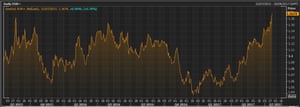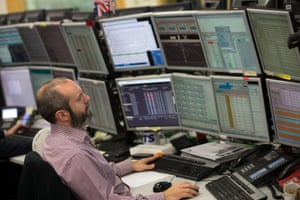Curiously, eurozone government bonds have actually strengthened this morning, pushing down the interest rates (or yield) on the debt.
You might expect them to have moved the other way, if the European Central Bank was really poised to trim its bond-purchase stimulus programme [which has been pushing prices up].
Chris Whittall of the WSJ agrees that it’s hard to square this with the euro’s rally:
Chris Whittall
(@Chris_Whittall)Still not quite sure I understand this ECB reaction. Euro up again today, bond yields down. Anyone?
It may indicate that investors have been convinced that the ECB will be in the market for a very long time, as Mario Draghi promised. It may also show that they have faith in Europe’s recovery, and believe that the eurozone debt crisis really is over…
The chatter in the City today is that the euro could hit $1.20 against the US dollar soon, for the first time since January 2015.
Bob Parker, investment committee member at Quilvest Investment Management, told CNBC that he expects the European Central Bank to trim its bond-purchase programme this autumn, and end it next year.
That would drive the euro higher.
Parker says:
Investors believe that the ECB QE programme will go to €40bn per month during the fourth quarter of 2017 [from €60bn today] and that the negative deposit rates will go.
This has been my view for the last three months and I assume that QE will end in 2Q18 [the second quarter of 2018].”
Yannis Koutsomitis
(@YanniKouts)#Euro could hit $1.20 by year end as #ECB‘s Draghi spurs rally: analysts say https://t.co/apZIUXm079 /via @CNBCi
Now at $1.1650 $EURUSD
Euro hits two-year high
There’s no holding the euro back this morning!
The single currency has romped to a fresh two-year high in early trading, as traders anticipate that the European Central Bank will cut its stimulus programme in the next few months.
The euro has jumped to $1.1677 against the US dollar, its strongest position since August 2015.

The euro vs the US dollar over the last two years Photograph: Thomson Reuters
The euro has also hit an eight-month high against the pound, at 89.77p, making foreign holidays more expensive for Brits.
Yesterday, ECB chief Mario Draghi said his governing council would discuss its bond-purchase scheme in the autumn. That opened up the possibility that it could decide to trim the pace of the programme at September’s meeting.
The ECB is planning to buy €60bn of debt each month with newly created money, up until December 2015. It also voted yesterday to keep interest rates at record lows.
Draghi did insist that the ECB would remain in the market for a long time, pointing out that inflation in the euro area is stubbornly below target.
But that hasn’t stopped the euro surging higher. And Peter Kinsella of Commonwealth Bank of Australia thinks it has further to go.
He told clients:
“It’s an armour-plated rally and it won’t stop.”
“Everything speaks in favour of further euro appreciation — increasing portfolio inflows, changing monetary policy, improved political risks.”
Updated
The agenda: UK public finances in focus

Good morning, and welcome to our rolling coverage of the world economy, the financial markets, the eurozone and business.
The main event today is Britain’s public finances for June.
With consumer spending subdued, and businesses fretting about Brexit, these figures will show how much the UK borrowed to balance the books last month. They should also indicate whether the UK is on track to hit its deficit targets this year.
City economists predict that the public sector net borrowing requirement (excluding the impact of state-owned banks) fell to £4.7bn last month, down from £6.7bn in May.
Last night, consultancy firm Fathom warned that the risks of a UK recession in the next year are now over 50%, so weak public finances might indicate that firms are struggling.
Alternatively, a strong reading would reassure investors.
Last week, the independent Office for Budget Responsibility warned that Britain’s public finances are vulnerable to shocks, as a recession is inevitable sooner or later….
We’re also getting a new inflation report from Canada, and a fresh count of how many oil rigs are pumping away in the US.
The agenda:
- 9.00am BST: ECB publishes survey of professional forecasters
- 9.30am BST: UK public finances for June
- 1:30pm BST: Canada inflation rate for June
- 6pm BST: US Baker Hughes weekly oil rig count
Updated
